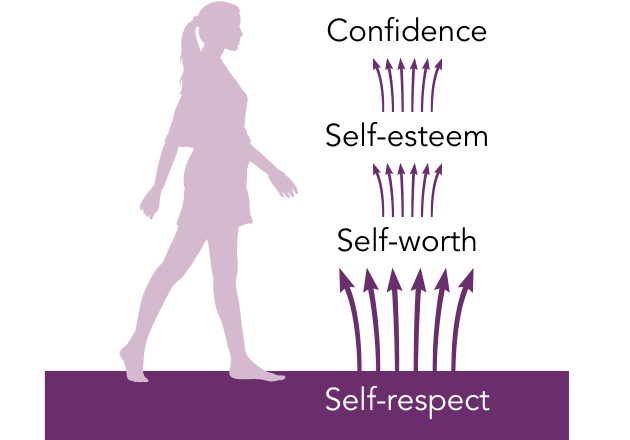The Self-Respect Revolution
When we respect ourselves, we respect others.
Keynotes | Masterclasses | Media
Why self-respect?
(vs self-esteem or confidence)
According to a recent survey of 22,000 people spanning 21 countries, 60% of respondents wished they had more respect for themselves.
But what is self-respect? Based on my research, it’s simply knowing that you are important. And when you feel this – truly – you extend the same grace to others. You start looking differently at the person sitting next to you on the bus, the colleague that always seems to have a bad day, or the family member who always seems to disagree with anything you have to say.
When it comes to personal and professional development, part of the problem is that discussions focus only on self-worth, self-esteem and confidence. While these are critical ingredients to feel whole and of value, self-respect, based on my research*, is the foundation that keeps them healthy and strong (much like a foundation supports a home).
In a world where disrespecting others because of our internal lack of it, now more than ever is the time to educate and inspire audiences with the untapped benefits of self-respect.
You start looking at people for who they are, not who you think they are.
That’s what a revolution is all about. It’s defined as a dramatic and wide-reaching change in conditions.
When I think about the world today and the world we’re building for the next generation, and how much disrespect we show to each other because of the pain and shame we all feel, it’s time, now more than ever, for that dramatic and wide-reaching change in conditions.
And that’s what the Self-Respect Revolution is all about, changing the relationship we have with ourselves and others so we can build a world where self-respect is prioritised, and is nurtured, valued, and celebrated.
A world where everyone knows they are important.
Why my talks on self-respect are different (vs talks on self-esteem, confidence, mindset & wellness)
My research confirms that while self-esteem and confidence are important, self-respect is the true foundation for personal and professional growth, especially for individuals who identify as high-achieving people-pleasers.
Women who identify as a high-achieving people-pleaser (HAPP) approach living their lives, their relationships and leadership roles with a very unique perspective. This is why mainstream talks on (for example) wellness, stress relief and mindset have either short term or no effect.
For example:
- Telling a HAPP to ‘take a day off’ provokes anxiety – doing more damage than good.
- Teaching them to be ‘confident’ when making important decisions does not tackle the underlying feeling of always being one decision away from losing everything.
- Burnout for them isn’t about exhaustion, it’s about anger and fear.Having navigated these challenges in my own life, I bring a personal touch to the experience, offering relatable anecdotes and real-world strategies through my research on self-respect.
So if you’re looking to inspire the incredible women in your company, team or audience and empower them with the benefits of healthy self-respect – I’d love to hear from you. Send me an email or explore more by downloading my speaker kit here (no email needed, it’s a direct download).
The Research
Reference: Iscoe, K.E., (2023) A Paradigm Shift in Understanding Self-Respect: Exploring Contemporary Perspectives. Manuscript in Preparation.
The Components of Self-Respect
Self-respect, a complex and multifaceted concept, has been a subject of great interest and debate among psychologists, philosophers, and scholars across various disciplines. Rooted in moral and ethical considerations, the notion of self-respect has traditionally been associated with adherence to societal norms and values. However, my recent qualitative study conducted on self-respect among a diverse group of highly successful and accomplished adults challenges this historical perspective.
Summary
Instead of focusing on moral and ethical dimensions, the study identifies themes that emphasise individual agency, personal growth, and well-being. This shift in understanding self-respect raises intriguing questions about the nature and dynamics of this essential psychological construct.

Research Methods
The study included interviews with 11 highly successful, mentally healthy adults aiming to capture a diverse range of experiences and perspectives regarding self-respect.
A mixed approach utilising both inductive and deductive methods was employed to analyse the data and identify themes. 783 significant quotes from the transcripts were extracted and coded them according to their relevance to self-respect.
The final three themes represented the rich and diverse perspectives on self-respect that emerged from the data.
The Findings
1. Self-acceptance
Discovering who you truly are, through self-awareness and judgement-free self-reflection, is the key to embracing and accepting every part of yourself, leading to a liberating feeling of self-acceptance.
2. Being true to yourself
My research revealed that making choices aligned with your happiness and taking responsibility for these choices (especially when they don’t play out as you predicted) is the key to not relying on external valiation and becoming paralysed by the fear of criticism.
3. Standing up for yourself
Understanding your boundaries, not only with others but most importantly the boundaries you have with yourself, is key to being able to stand up for yourself so you can prioritise your own needs, ultimately leading to a stronger sense of self-empowerment.
“We first need to change the relationship we have with ourselves to be able to change the relationship we have with others. But without self-respect, we will never be able to respect others.”
(No email needed, direct download)
How is self-respect different than confidence or self-esteem?
My research shows that self-respect acts much like the foundation of a house, to support the self-respect ‘sisters’ – self-esteem, self-worth and confidence.

TEST YOUR KNOWLEDGE
How would you define self-esteem? How is it different from self-respect? Have a think, then click on the box to reveal the meaning.
(p.s. I’ve also included an example of doing a cartwheel to explain how each would sound like, feel like and look like.)
Self-esteem
Do I feel good about myself?
How do I feel about myself after everyone saw me fall doing a cartwheel?
Self-Worth
Do I feel like I am of value?
Do I still deserve to be loved after everyone saw me fall doing a cartwheel?
Self-respect
Am I staying true to myself?
Do I even want to do a cartwheel?
Self-Efficacy
Can I do it?
Do I believe I can successfully do a cartwheel?
Confidence
Do I trust myself to try?
Am I willing to attempt a cartwheel?
Competence
Do I possess the skills?
Do I have the specific skills to do a cartwheel? Yes or no?
Courage
Am I willing to take this risk?
I might get injured doing a cartwheel, but am I willing to take that risk to try something new?

Get in touch
I’d love to help you create an unforgettable event.
Whether you’re looking for a keynote speaker to open or close your event with electric energy and passion, or someone to inspire and motivate your company, team or audience and empower them with the benefits of healthy self-respect, I’d love to hear from you. Get in touch and let’s create a magical experience together.
